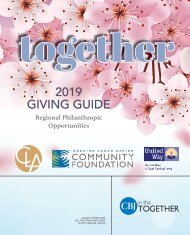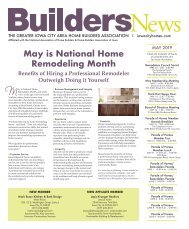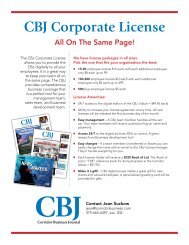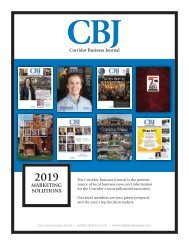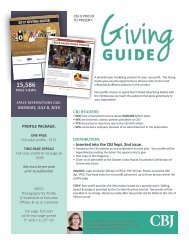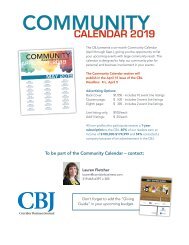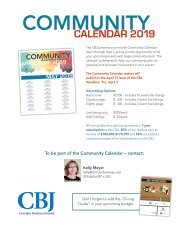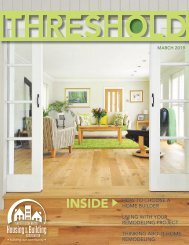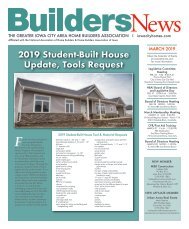Lure4.2017
Create successful ePaper yourself
Turn your PDF publications into a flip-book with our unique Google optimized e-Paper software.
ORGANIZATION<br />
A national expert in minimalism<br />
offers tips for getting back to basics<br />
Rightsizing for the Next Chapter<br />
BY CINDY HADISH<br />
The business<br />
concept of<br />
rightsizing a<br />
company’s<br />
footprint through<br />
a proactive,<br />
strategic plan can<br />
apply to lifestyle<br />
choices as well.<br />
Baby boomers, born between 1946-1964, are heading into retirement at a rate of<br />
about 10,000 per day, with an increasing number of them moving from spacious<br />
homes in the suburbs to more compact homes in the city.<br />
Retirement or not, anyone debating a move could benefit from rightsizing their<br />
material footprint, by cutting through clutter and reorganizing their possessions.<br />
During a recent Professional Women’s Network event at the Cedar Rapids<br />
Marriott, Joshua Becker, founder of “Becoming Minimalist,” offered some strategies<br />
for living more simply that apply to all stages of life.<br />
Mr. Becker, author of “Clutterfree with Kids” and other best-sellers, is one of the<br />
leading voices of following a minimalist lifestyle with fewer possessions.<br />
“Simplicity brings balance, freedom and joy,” he writes on his blog. “When we<br />
begin to live simply and experience these benefits, we begin to ask the next question,<br />
‘Where else in my life can I remove distraction and simply focus on the essential?’”<br />
Some tips from Mr. Becker’s talk that can help in the rightsizing process:<br />
n Determine what you value and need in your life. Essential needs may<br />
vary greatly depending on that determination. Someone who plans to travel<br />
extensively, for example, would need different possessions compared to a<br />
person who has several pets or wants to stay at home to garden. “Ask yourself,<br />
‘what do I want my life to be about?’” Mr. Becker said. “It’s about value: what<br />
things do you need in order to do that.”<br />
n Start on the easiest, most lived-in areas. Mr. Becker began with his car;<br />
removing everything and saving only those things that were important, such as<br />
a pair of sunglasses and the vehicle manual.<br />
n Move room to room. Begin with the place in your home that already is the<br />
most organized, saving closets, the basement and garage, where clutter tends<br />
to accumulate, for last.<br />
n Focus on your own possessions. “It’s always easier to see someone else’s<br />
junk,” Mr. Becker said. “But you can’t start throwing out your spouse’s stuff or<br />
your kids’ stuff first.”<br />
n Stay on top of paper clutter by digitizing documents and photos.<br />
Unsubscribe to junk mail and handle the mail on a daily basis, immediately<br />
recycling what can be tossed and saving other items into a folder to be<br />
reviewed on a weekly basis.<br />
n Match cups, bowls, plates and silverware for better uniformity in stacking<br />
and storing. Donate those items that don’t match. If there is one souvenir cup<br />
or mug that is so important you can’t live without it, that’s perfectly fine. Just<br />
don’t keep five of them.<br />
n Get rid of guilt by donating to places that can benefit by reselling<br />
your items, including the Salvation Army and Goodwill, and look for other<br />
organizations that could use the items, as well, such as giving pots and pans and<br />
blankets to a refugee resettlement group and clothing to women’s shelters. |<br />
36 LUREOF THE CITY





